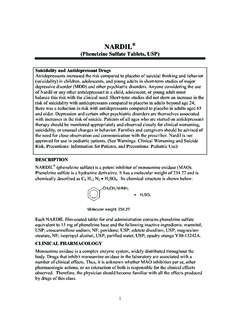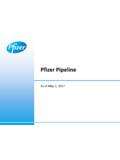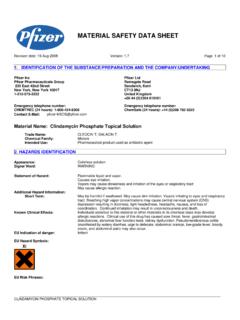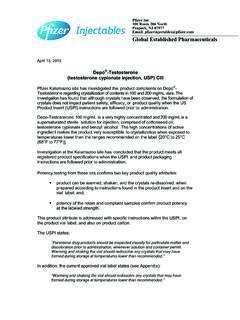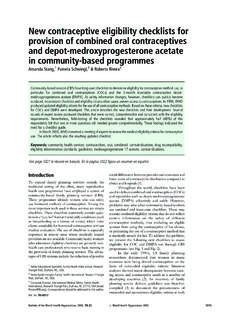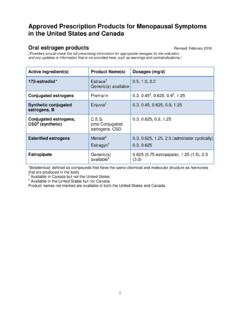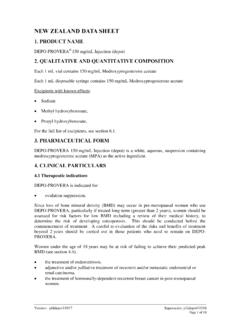Transcription of USPI medroxyprogesterone acetate - Depo …
1 depo -Provera . medroxyprogesterone acetate injectable suspension, USP. DESCRIPTION. depo -PROVERA Sterile Aqueous Suspension contains medroxyprogesterone acetate , which is a derivative of progesterone and is active by the parenteral and oral routes of administration. It is a white to off-white, odorless crystalline powder, stable in air, melting between 200 and 210 C. It is freely soluble in chloroform, soluble in acetone and in dioxane, sparingly soluble in alcohol and methanol, slightly soluble in ether and insoluble in water.
2 The chemical name for medroxyprogesterone acetate is Pregn-4-ene-3,20-dione, 17- (acetyloxy)-6-methyl-, (6 )-. The structural formula is: depo -PROVERA for intramuscular injection is available as 400 mg/mL. medroxyprogesterone acetate . Each mL of the 400 mg/mL suspension contains: medroxyprogesterone acetate ..400 mg Polyethylene glycol mg Sodium sulfate anhydrous ..11 mg with Myristyl-gamma-picolinium chloride .. mg added as preservative When necessary, pH was adjusted with sodium hydroxide and/or hydrochloric acid.
3 ACTIONS. 1. medroxyprogesterone acetate , administered parenterally in the recommended doses to women with adequate endogenous estrogen, transforms proliferative endometrium into secretory endometrium. medroxyprogesterone acetate inhibits (in the usual dose range) the secretion of pituitary gonadotropin which, in turn, prevents follicular maturation and ovulation. Because of its prolonged action and the resulting difficulty in predicting the time of withdrawal bleeding following injection, medroxyprogesterone acetate is not recommended in secondary amenorrhea or dysfunctional uterine bleeding.
4 In these conditions oral therapy is recommended. INDICATIONS AND USES. Adjunctive therapy and palliative treatment of inoperable, recurrent, and metastatic endometrial or renal carcinoma. CONTRAINDICATIONS. 1. Known or suspected pregnancy or as a diagnostic test for pregnancy 2. Undiagnosed vaginal bleeding 3. Known or suspected malignancy of breast 4. Active thrombophlebitis, or current or past history of thromboembolic disorders, or cerebral vascular disease 5. Liver dysfunction or disease 6. Known sensitivity to depo -PROVERA ( medroxyprogesterone acetate or any of its other ingredients).
5 WARNINGS. 1. Pregnancy The use of progestational drugs during the first four months of pregnancy is not recommended. Progestational agents have been used beginning with the first trimester of pregnancy in attempts to prevent abortion but there is no evidence that such use is effective. Furthermore, the use of progestational agents, with their uterine-relaxant properties, in patients with fertilized defective ova may cause a delay in spontaneous abortion. 2. Intrauterine Exposure Several reports suggest an association between intrauterine exposure to progestational drugs in the first trimester of pregnancy and genital abnormalities in male and female fetuses.
6 The risk of hypospadias (5 to 8 per 1,000 male births in the general population) may be approximately doubled with exposure to these drugs. There are insufficient data to quantify the risk to exposed female fetuses, but insofar as some of these drugs induce mild virilization of the external genitalia of the female fetus, and because of the increased association of hypospadias in the male fetus, it is prudent to avoid the use of these drugs during the first trimester of pregnancy. 2. If the patient is exposed to depo -PROVERA Sterile Aqueous Suspension during the first four months of pregnancy or if she becomes pregnant while taking this drug, she should be apprised of the potential risks to the fetus.
7 3. Thromboembolic Disorders The physician should be alert to the earliest manifestations of thrombotic disorder (thrombophlebitis, cerebrovascular disorder, pulmonary embolism, and retinal thrombosis). Should any of these occur or be suspected, the drug should be discontinued immediately. 4. Ocular Disorders Medication should be discontinued pending examination if there is a sudden partial or complete loss of vision, or if there is a sudden onset of proptosis, diplopia or migraine. If examination reveals papilledema or retinal vascular lesions, medication should be withdrawn.
8 5. Lactation Detectable amounts of drug have been identified in the milk of mothers receiving progestational drugs. The effect of this on the nursing infant has not been determined. 6. Multi-dose Use Multi-dose use of DEPOPROVERA Sterile Aqueous Suspension from a single vial requires special care to avoid contamination. Although initially sterile, any multi-dose use of vials may lead to contamination unless strict aseptic technique is observed. PRECAUTIONS. 1. Physical Examination It is good medical practice for all women to have annual history and physical examinations, including women using depo -PROVERA Sterile Aqueous Suspension.
9 The physical examination, however, may be deferred until after initiation of depo -PROVERA if requested by the woman and judged appropriate by the clinician. The physical examination should include special reference to blood pressure, breasts, abdomen and pelvic organs, including cervical cytology and relevant laboratory tests. In case of undiagnosed, persistent or recurrent abnormal vaginal bleeding, appropriate measures should be conducted to rule out malignancy. Women with a strong family history of breast cancer or who have breast nodules should be monitored with particular care.
10 2. Fluid Retention Because progestational drugs may cause some degree of fluid retention, conditions which might be influenced by this condition, such as epilepsy, migraine, asthma, cardiac or renal dysfunction, require careful observation. 3. Vaginal Bleeding In cases of breakthrough bleeding, as in all cases of irregular bleeding per vaginum, nonfunctional causes should be borne in mind and adequate diagnostic measures undertaken. 4. Depression Patients who have a history of psychic depression should be carefully observed and the drug discontinued if the depression recurs to a serious degree.

